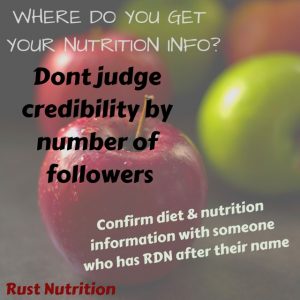March ushers in National Nutrition Month® – a month to reflect on your eating and exercise habits, and make positive lifestyle changes. It’s also a time when registered dietitians try to convince you to find your diet and nutrition advice from a credentialed professional.

Why a Registered Dietitian?
The registered dietitian/nutritionist (RDN) must meet a minimum education requirement and have a supervised training experience, prior to being eligible to sit for the registration exam. They must also continue their education each year throughout his or her career, in order to maintain that credential.
All of this includes a deep dive into not just food and nutrition, but also human physiology, biochemistry, and a general understanding for how the body’s digestive, cardiovascular, and endocrine systems work.
How to Spot A Poser
Many who may claim to be diet experts (on the Internet – Facebook, Instagram, and other social platforms) have absolutely no science background or formal education in food or nutrition science. Often, they have a huge social media following, and some of these imposters even write best-selling books. Despite the numbers, many of these self-claimed “experts” don’t have all of the information, and worse, don’t have any governing bodies requiring them to be ethical. In other words – they can say anything (most medical professionals, such as RDNs, have a Code of Ethics).

Who are these folks? Well, they are often someone who has had a personal experience with weight loss, or has achieved a level of fitness (it’s often the superficial “look” that they may market to sell their diet or products). Others may indeed have a medical background (like physicians) but may force their own personal eating styles (bias), as opposed to fully embracing all of the evidence and the vast number of lifestyle, behavioral, and cultural factors involved in a person’s food choices.
Other times these “experts” are “science journalists”. I have nothing against journalists, but just because you can do research on a subject, does not make you the same kind of expert as the person who has both studied, researched, and applied the topic in practice. Diet book authors who are only journalists have no medical or science background (dietetics and nutrition fall into both the medical and science categories), may use small surveys of individuals to create their hypotheses or support their positions on how people should eat.
Nutrition poser’s usually have these things in common:
- Recommend you avoid sugar (“because it’s toxic”)
- Usually promotes rigid “rules” to eating which eliminates most carbohydrates (especially wheat – bread, pasta, crackers, baked goods)
- Recommends eating mostly meats and protein or fatty food (keto-style, Whole 30)
- Uses catchy titles make the the diet plan seem easy
- They make the diet plans sound appealing by asking you “do you suffer from low energy?” and other ridiculous questions (everyone has lows and highs in energy levels from week to week)
- Strong statements claiming that certain food groups (almost always carbohydrates) are secretly having a negative impact on your health and fitness
- Promises weight loss in the shortest time possible, and use buff body photos to sell it.
The problems with the above blanket recommendation? There is no science to support this sort of diet and lifestyle. It also can leave you with a diet deficient in many vitamins and minerals, requiring you to take supplements. And, it’s likely not sustainable for long term health (and life!).
For instance, there’s no evidence of the long-term health impact of a very high fat, low carbohydrate diet, and no evidence that it’s “better” than a low fat, high carbohydrate diet for weight loss (when calories are controlled). Can a low carbohydrate diet work for weight loss? Absolutely. But it’s not the only option, and it doesn’t mean “sugar is toxic” nor that your “energy levels will be through the roof!” as soon as you adopt it.
Eating well can be easy at times, but it can also be quite difficult to maintain on a day to day basis. There’s a lot of junk food out there to contend with. I’m never going to tell you that you should never treat yourself (or feel guilty about it!), nor that you should completely avoid any one food or food gruop. Since most people enjoy indulging in food and drink once in a while (pizza, potato chips, dessert, birthday cake, cocktails, burgers, fried food, etc), some may find that is seems easier following a strict set of rules instead of just managing cravings or splurges on a regular basis. But does it really work for long-term health?
If you find that “challenging” yourself to eliminate certain foods for a week (or two weeks, or 30 days) helps you stay on track, fine. But if you find yourself having to do it over and over, year after year, and you are not sustaining your weight, or sustaining better biomarkers (thinks like blood sugar, blood pressure, blood cholesterol and lipids), then you might conclude that these temporary fixes aren’t really worth it, nor are they working.
Be A Critical Thinker
The tricky part is that some of the information these diet book authors dole out is plausible, however most of it is misleading, or downright false. They generally don’t support evidence-based (well-researched) dietary plans. I am biased for adopting a DASH Diet, a Mediterranean Diet (because they are both evidence-based), or a plant-based diet, but I certainly don’t assume everyone should, or needs to, eat this way.
That’s just one of many differences between a Poser and a Registered Dietitian. An RDN is not going to automatically suggest a diet plan for you. He’s going to fully assess your health, medical history, social history, and more – to make a determination about what sort of dietary plan may work best for you.
I recommend you celebrate National Nutrition Month® this year with some critical thinking. Don’t share every sounds-too-good-to-be true or sounds-a-bit-wacky advice you see posted on Facebook or elsewhere. THINK. Ask questions such as “Where did this originate?” “What do other experts have to say on the topic?”
And – Check in with a registered dietitian to confirm what’s best for you.





hello! Fellow RD here:)
Very good advice!